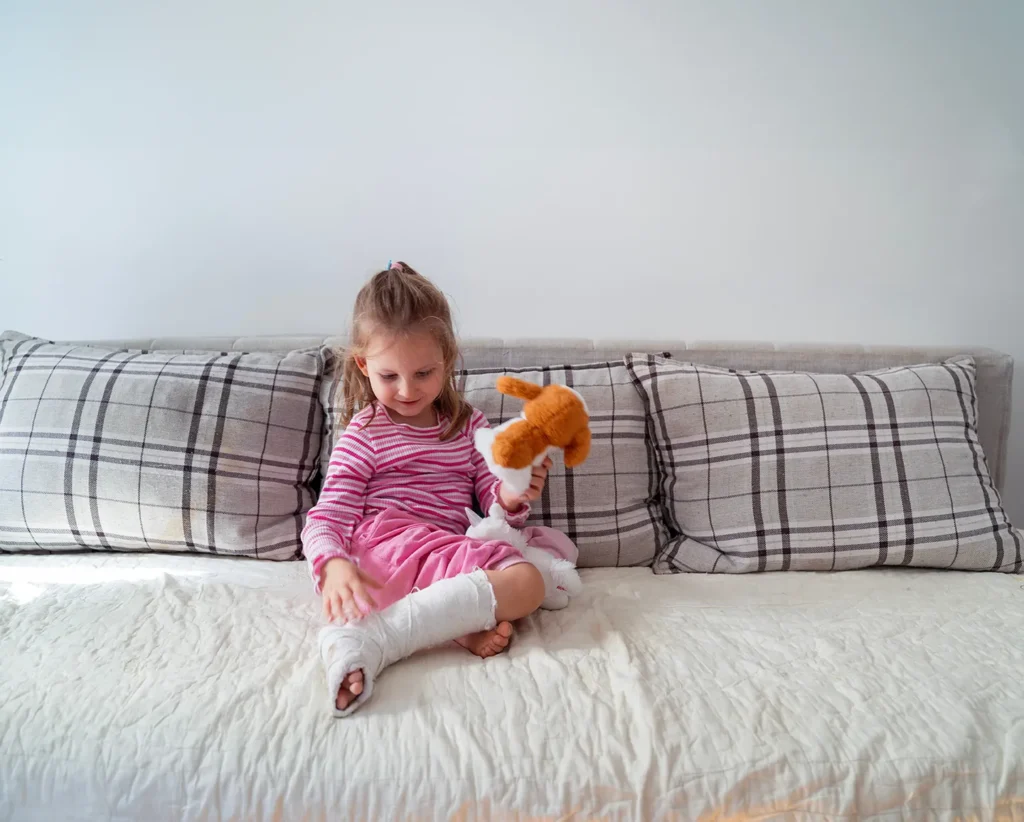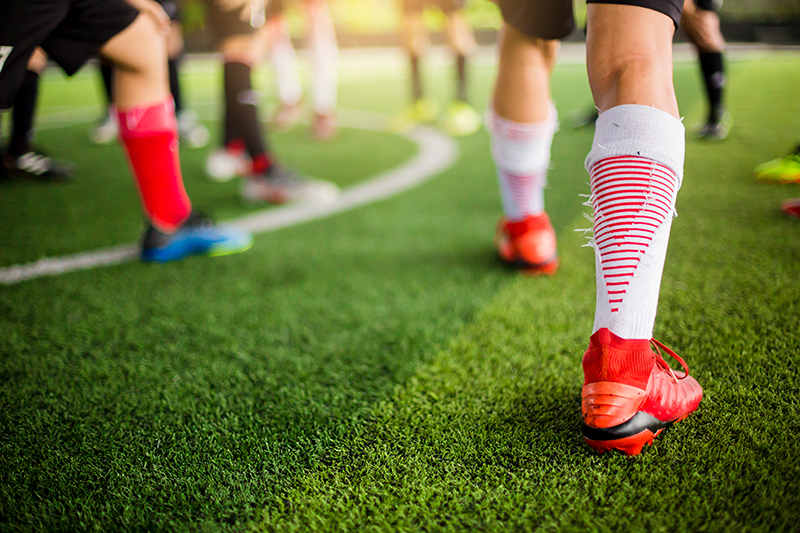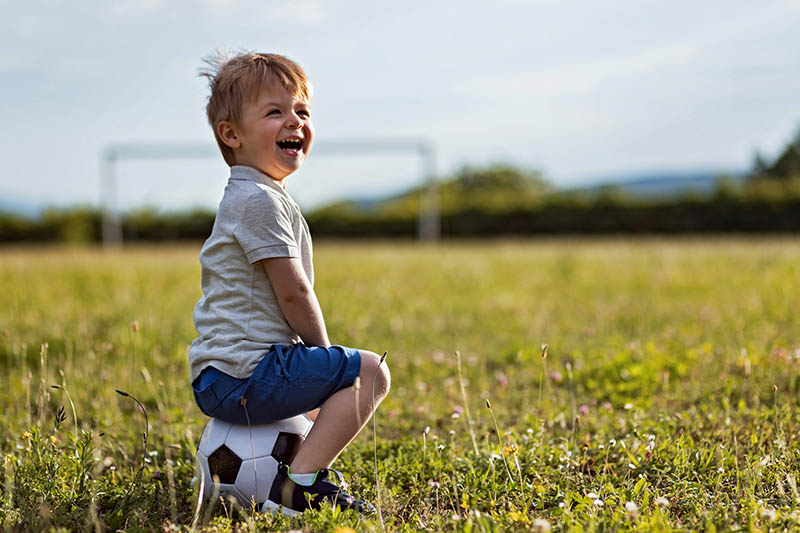After your child undergoes pediatric orthopedic surgery, a smooth recovery is essential for their healing and overall well-being. In this guide, we’ll discuss post-operative care, pain management, and key steps to support your child’s recovery at home.
Understanding Post-Surgical Pain: What to Expect
Parents often wonder what causes pain after surgery. During surgery, tissues and nerves are cut, which activates the body’s natural injury response. Chemicals called neurotransmitters are released, sending pain signals to the brain. While this process is normal, it can result in discomfort, inflammation, and muscle spasms.
At The Pediatric Orthopedic Center, we take a proactive approach to pain management. Our surgeons use minimally invasive techniques to reduce trauma, and our anesthesiologists often administer pain medications before surgery to prevent or minimize post-surgical pain.
How Long Does Pain Last After Pediatric Surgery?
The duration of pain after surgery can vary depending on the type of procedure. For less invasive surgeries, pain may last between 24 to 48 hours. For more extensive procedures, such as setting a bone or correcting a deformity, discomfort may persist for several days. It’s important to monitor your child closely during this period and follow all post-operative care instructions.
Pain Management After Pediatric Orthopedic Surgery
Managing pain is a crucial part of your child’s recovery. There are several effective pain management techniques that can be used at home or under the guidance of your child’s pediatric orthopedic surgeon. Here are some common methods to help alleviate pain:
- Compression Bandage: A snug bandage around the surgical site can help reduce swelling and provide support.
- Ice and Elevation: Applying ice to the affected area and elevating the limb can minimize swelling and discomfort. It’s important to ice the area frequently during the first few days post-surgery.
- Therapeutic Exercises: Gentle, doctor-approved exercises can help improve range of motion and promote healing while managing pain.
- Pain Medications: Over-the-counter pain relievers like acetaminophen (Tylenol) or medications prescribed by your surgeon can effectively control post-surgical pain. Be sure to follow dosing instructions carefully.
- Nerve Blocks: In some cases, an anesthesiologist may administer a nerve block during surgery to temporarily prevent pain. This can be especially helpful for more complex procedures.
Distraction is another useful pain management technique. Engaging your child in activities such as watching a movie, playing a game, or reading can take their mind off the discomfort and make recovery more bearable.
Post-Surgery Care at Home
Proper care at home is essential to a successful recovery after pediatric orthopedic surgery. Here are some key steps to follow:
- Wound Care: Keep the surgical site clean and dry. Follow the surgeon’s instructions on when to remove or change bandages, and look for signs of infection, such as increased redness, swelling, or drainage.
- Mobility: Encourage your child to rest, but also follow any instructions regarding safe movement and physical therapy. For many procedures, early movement and exercises are critical to avoid stiffness and promote healing.
- Diet and Hydration: Make sure your child stays hydrated and eats a balanced diet to support their recovery. Avoid heavy, greasy foods that could upset their stomach, especially while they’re taking medications.
When to Contact Your Pediatric Orthopedic Surgeon
It’s important to know when to reach out to your child’s pediatric orthopedic surgeon for further guidance. You should contact the surgeon if your child experiences:
- A fever above 102 degrees Fahrenheit
- Significant swelling that doesn’t improve with ice and elevation
- Persistent, severe pain not relieved by medication
- Redness, warmth, or drainage from the surgical site
- Difficulty breathing or chest pain
These symptoms could indicate complications, and your surgeon will provide the best course of action to address them.
Supporting Your Child Emotionally During Recovery
Recovering from surgery can be a challenging time for children, not just physically but emotionally as well. Here are some tips to help support your child’s emotional recovery:
- Offer Reassurance: Let your child know that their feelings are normal and that healing takes time. Offer plenty of comfort and encouragement.
- Provide Entertainment: Keeping your child entertained during recovery can help distract them from pain and boredom. Offer activities like puzzles, books, or favorite movies.
- Involve Them in Their Care: Depending on your child’s age, allowing them to take part in simple aspects of their recovery, like adjusting their ice pack or helping with a small task, can boost their confidence and make them feel more in control.
How to Ensure a Successful Recovery After Pediatric Surgery
To ensure a successful recovery, follow all post-surgical instructions closely and attend any follow-up appointments. It’s important to keep your child’s pediatric orthopedic team informed about their progress and any concerns you have during the recovery period.
In some cases, physical therapy will be a necessary part of the healing process. Our team works closely with Schroth-certified physical therapists to help children recover from surgeries related to scoliosis and other orthopedic conditions. Starting physical therapy early can help your child regain strength, flexibility, and function.
Why Choose The Pediatric Orthopedic Center for Post-Surgery Care
At The Pediatric Orthopedic Center, we’re committed to providing comprehensive care every step of the way—from surgery to recovery. Our team of board-certified pediatric orthopedic surgeons will guide you through the entire recovery process, ensuring that your child heals safely and comfortably.
With the latest advancements in pediatric orthopedic care, including our low-dose EOSedge imaging system and a range of surgical specialties, your child will receive the best care available. If your child has had surgery or needs a consultation, contact us at one of our three convenient locations in Cedar Knolls, Springfield, and Wayne.



